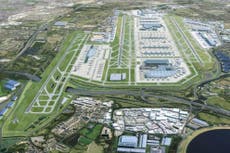What does Heathrow third runway ruling mean for the climate crisis?
The UK’s top court today overturned a landmark ruling finding Heathrow expansion plans were unlawful because ministers did not adequately consider the climate crisis. But this doesn’t mean Heathrow’s third runway has the green light, experts tell Daisy Dunne


This morning, the UK’s top court overturned a landmark ruling finding Heathrow’s third runway to be unlawful on climate crisis grounds.
It is a blow for environmental and local campaigners, who have been battling to prove the planned expansion would not be compatible with the UK’s long-term climate goals since the runway was first approved in 2018.
In February of this year, the Court of Appeal found in favour of campaigners. In a landmark ruling, it said plans for Heathrow expansion were unlawful because ministers failed to fully take into consideration their obligations under the Paris Agreement.
The ruling was the first of its kind to hinge on the Paris Agreement, the international deal aimed at keeping global warming “well below” 2C, which was made just over five years ago.
But today, the Supreme Court ruled that the former transport minister Chris Grayling had acted lawfully when setting out his support for the project because he took into account the climate targets in place at the time. Those targets were less rigorous than the pledges in place today.
Despite the ruling, it is likely that the firm behind Heathrow will face significant challenges in bringing plans for a third runway to fruition, Katie de Kauwe, a lawyer at Friends of the Earth, one of two charities behind the legal battle against Heathrow expansion, tells The Independent.
“The result is not the one we were hoping for but I think the judgment makes it very clear that, in order to progress to build a third runway at Heathrow, planning permission has to be obtained.
“At that stage, our new tightened targets, which were not in place at the time that the policy supporting Heathrow expansion was adopted back in June 2018, have got to be taken into account.”
In 2019, the UK set a legal target of meeting net zero emissions by 2050. And last week, the UK’s independent climate advisers for the first time set out in detail how the UK could meet that target.
In its advice to the government, the Climate Change Committee said there should be no new “net” airport expansion in the coming decades if the UK is to meet its net zero pledge. (The advice suggests any new airport expansion would need to be met with tougher restrictions elsewhere.)
This is unless the aviation sector can “significantly outperform its emissions trajectory”, according to the CCC.
It is very unlikely that aviation will be able to rapidly cut its emissions. Air travel is a particularly polluting form of transport for two main reasons. First, the burning of jet fuel causes the release of greenhouse gas emissions, particularly CO2. Second, aircraft also produce other climate-warming substances, such as water vapour, soot and nitrogen oxides.
Low-carbon alternatives, such as electric or hydrogen-powered planes, have been piloted, but are still some way away from becoming a commercial reality.
“Given the CCC advice, it looks very difficult, from our perspective, to see how [Heathrow] can square that circle,” adds De Kauwe.
In defence of its planned third runway, representatives from Heathrow airport have previously claimed expansion would be necessary to meet increased demand for air travel in the future.
A Heathrow airport spokesperson said after the judgment: “This is the right result for the country, which will allow Global Britain to become a reality. Additional capacity at an expanded Heathrow will allow Britain as a sovereign nation to compete for trade and win against our rivals in France and Germany.”
But the pandemic has seen demand for air travel rapidly decline, and it is currently unknown whether it will ever get back to the levels seen before the pandemic, said a spokesperson from the Aviation Environment Federation (AEF).
“Whether business travel – the main money-spinner for many of Heathrow’s airlines – will ever be the same is in fact doubtful now that working practices have shifted towards virtual meetings online,” AEF said in a statement.
All of these factors make it “very difficult to see how Heathrow will ever be able to build that third runway”, said De Kauwe.
The UK government did not join Heathrow Airport Ltd in its appeal to the Supreme Court, and Boris Johnson has previously vocally opposed plans for a third runway.
John Sauven, executive director of Greenpeace UK, said: “Heathrow Ltd have squeaked out a belated legal win, but history has moved on.
“Now the ball is in the government’s court, it’s hard to imagine Boris Johnson wanting to resurrect a project that makes no business or environmental sense. With a UK-hosted climate summit just a year away, the government should draw a line under this sorry saga.”
The Independent approached a government spokesperson for comment.



Join our commenting forum
Join thought-provoking conversations, follow other Independent readers and see their replies
Comments